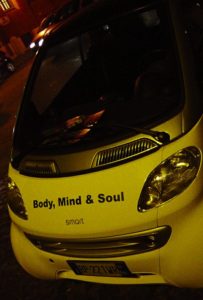 Our western church, as we mentioned last month, is absolutely awash in old-fashioned philosophical dualism. At a deep, mostly unconscious level, we have come to picture the world in terms of “sacred” and “secular,” “spiritual” and “material” – two vast, unrelated realms of human life and experience. The perspective has been characteristic of our Western view of the world since the heyday of Greek philosophy, more than two thousand years ago. It still is.
Our western church, as we mentioned last month, is absolutely awash in old-fashioned philosophical dualism. At a deep, mostly unconscious level, we have come to picture the world in terms of “sacred” and “secular,” “spiritual” and “material” – two vast, unrelated realms of human life and experience. The perspective has been characteristic of our Western view of the world since the heyday of Greek philosophy, more than two thousand years ago. It still is.
You may not have thought so, of course: we certainly feel more integrated than this. Yet the evidence of our dualism is everywhere.
When we imagine that faith-things are for Sunday while other values apply through the rest of the week, we are dualists. We have made our faith a reduced compartment of our lives, and relegated the rest to alternative interests.
When we think that the gospel is simply for our souls and has little to do with our behavior, we are dualists. Or when we suppose that following Jesus is basically a frame of mind rather than, let’s say, a way to live in holiness and mission, then we are dualists, too. We have divided spirit and body, heaven and earth, into two unconnected compartments – as if our bodily, earthly lives were utterly autonomous, or heaven in the end irrelevant.
Our dualist view of the world becomes especially clear in our exposition of Scripture. When we emphasize, for example, the moral example of Christ over and above his actual, angular life as attested in the pages of Scripture, we are dualists. We begin to imagine that some “spiritual” Jesus is the Jesus that concerns us – a “Christ-principle,” we sometimes say, beyond the inconvenient details of the very man from Galilee. The result is a weakened and fractured, dualistic faith, built upon a fractured Jesus.
The remedy for Greek dualism is biblical holism. Holistic Christians will want to take the whole of Jesus into view – just at his word, just as he comes to us in the pages of the Bible. They will want to hear his whole word, in law and gospel. They will want to participate in his whole mission to the world that surrounds them. They will discover that it is a mission for our inner lives and our outer lives. It is for our Sunday lives and for the rest of the week, as well. It is grace for a guilty conscience, to be sure; it is a path to walk and a life to live, too. It is a message of grace and purpose for every conceivable subset of our lives: our sexual lives, our lives in society, our political and economic lives – our business/farming/family/community lives, etc., as well as our interior “spiritual” selves.
In this little community, it is our aim to witness to the whole gospel in a “holistic” sort of way. In our Mission Handbook, we describe the goal: “doing good to all people in the name of Jesus Christ, in order to overcome evil, heal and help people and thus make life more like God wants it to be” – and “preaching the Word of God and announcing the Kingdom of God in word and deed in order that sinners might repent and believe the Gospel of Christ” (¶147e). There is a balance here. Witness in word without corresponding deed, to borrow an image from E. Stanley Jones, is like a “soul without a body.” But loving deeds without the word of proclamation is like a “body without a soul.” “One is a ghost and the other is a corpse,” Jones said famously. He gets the balance right.
Now at Christmas-time, let’s work to “get the balance right,” as well. The incarnation, if we take the concept seriously, puts the lie to every human dualism. The eternal has invaded our temporal world. God himself has become a man – and not any man, or some “Christ-principle,” if you please, or some lovely attitude of magnanimity. God became a Certain Man, who said and did Certain Things, who died and rose and promises – this Man – to come again in glory.
Luther reminded us that all religions “begin at the top” – that is, in some dualistic, hyper-spiritualized sphere of imagined reality. But the Christian religion “begins at the very bottom.” It begins in a simple, holistic sort of way – at the stable and “the lap of the mother.” It looks to Jesus – “being born, nursed, and growing up, walking among men, teaching, dying, returning from the dead, and being exalted above all the heavens, in possession of power over all” (WA, XL, Part 1).
“You must begin at the bottom,” too, Luther tells us. Say: “I do not want to know God until I have first known this Man; for so read the passages of Scripture: ‘I am the Way, the Truth, and the Life’; again: ‘No man cometh unto the Father but by Me'” (John 14:6). (WA, XXXVI, 61)
This is our holistic witness. It is also our only best gift to the world.
Other posts in this Elements at Our Heart series: